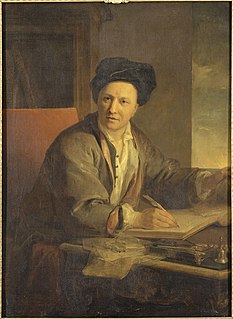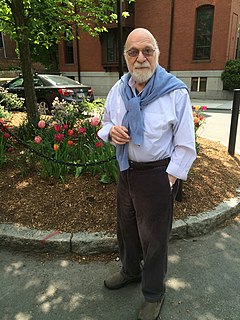A Quote by Washington Irving
If I can, by a lucky chance, in these uneasy days, rub out one wrinkle from the brow of care, or beguile the heavy heart of one moment of sadness; if I can, how and then, prompt a happier view of human nature, and make my reader more in good humor with his fellow-beings and himself, surely, I shall not have written in vain.
Related Quotes
My whole effort is how to beautify this present moment, how to make people more celebrating, how to make people more joyous, how to give them a little glimpse of blissfulness, how to bring laughter to their life. Then the future takes care of itself. You need not think of the tomorrow, it comes. It comes out of this moment. Let this moment be of great celebration.
In a community of human beings working together, the well-being of the community will be the greater, the less the individual claims for himself the proceeds of the work he has himself done; i.e., the more of these proceeds he makes over to his fellow workers, and the more his own requirements are satisfied, not out of his own work done, but out of work done by the others.
A new danger now beset him [Grotius], the danger of becoming simply a venal pleader, a creature who grinds out arguments on this or that side, for this or that client: a mere legal beast of prey. Fortunately for himself and for the world he took a higher view of his life-work: his determination clearly was to make himself a thoroughly equipped jurist, and then, as he rose more and more in his profession, to use his powers for the good of his country and of mankind.
How shall we define occultism? The word is derived from the Latin occultus, hidden; so that it is the study of the hidden laws of nature. Since all the great laws of nature are in fact working in the invisible world far more than in the visible, occultism involves the acceptance of a much wider view of nature than that which is ordinarily taken. The occultist, then, is a man who studies all the laws of nature that he can reach or of which he can hear, and as a result of his study he identifies himself with these laws and devotes his life to the service of evolution.
There is no limit to suffering human beings have been willing to inflict on others, no matter how innocent, no matter how young, and no matter how old. This fact must lead all reasonable human beings, that is, all human beings who take evidence seriously, to draw only one possible conclusion: Human nature is not basically good.
The Lord is my peace. I shall not live in anxiety. He puts me under His wing of comfort and calms my spirit within me. He takes all my anxieties on Himself and helps me to focus on Him. Yes, though I walk through a time of grave uncertainties and fierce anxieties, I will not fret - for You are my peace. Your Word and Your presence calm me now. You hold my uncertainties in the palm of Your hand. You soothe my anxious mind - You smooth my wrinkled brow. Surely serenity and trust in You shall fill me all the days of my life. And I shall keep my mind stayed on You forever.
Kafka often describes himself as a bloodless figure: a human being who doesn't really participate in the life of his fellow human beings, someone who doesn't actually live in the true sense of the word, but who consists rather of words and literature. In my view, that is, however, only half true. In a roundabout way through literature, which presupposes empathy and exact observation, he immerses himself again in the life of society; in a certain sense he comes back to it.
It is critical to realize that underlying the extermination of nature is the marginalization of human beings. If we are to save what is wild, what is irreparable and majestic in nature, then we will ironically have to turn to each other and take care of all the human beings here on Earth. There is no boundary that will protect an environment from a suffering humanity.
If a man has no worries about himself at all for the sake of love toward God and the working of good deeds, knowing that God is taking care of him, this is a true and wise hope. But if a man takes care of his own business and turns to God in prayer only when misfortunes come upon him which are beyond his power, and then he begins to hope in God, such a hope is vain and false. A true hope seeks only the Kingdom of God... the heart can have no peace until it obtains such a hope. This hope pacifies the heart and produces joy within it.
It would have been better to come back at the same hour,” said the fox. “If, for example, you came at four o’clock in the afternoon, then at three o’clock I shall begin to be happy. I shall feel happier and happier as the hour advances. At four o’clock, I shall already be worrying and jumping about. I shall show you how happy I am! But if you come at just any time, I shall never know at what hour my heart is to be ready to greet you . . . One must observe the proper rites . . .
SADNESSES OF THE INTELLECT: Sadness of being misunderstood [sic]; Humor sadness; Sadness of love wit[hou]t release; Sadne[ss of be]ing smart; Sadness of not knowing enough words to [express what you mean]; Sadness of having options; Sadness of wanting sadness; Sadness of confusion; Sadness of domes[tic]ated birds; Sadness of fini[shi]ng a book; Sadness of remembering; Sadness of forgetting; Anxiety sadness.
Human beings have rights, because they are moral beings: the rights of all men grow out of their moral nature; and as all men havethe same moral nature, they have essentially the same rights. These rights may be wrested from the slave, but they cannot be alienated: his title to himself is as perfect now, as is that of Lyman Beecher: it is stamped on his moral being, and is, like it, imperishable.






































